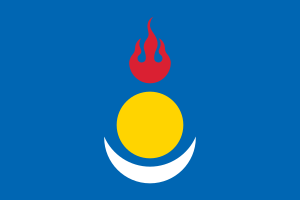This article needs additional citations for verification. (April 2022) |
The Inner Mongolian independence movement (Chinese: 内蒙古独立运动), also known as the Southern Mongolian independence movement (Chinese: 南蒙古独立运动), is a movement for the independence of Inner Mongolia (also known as Southern Mongolia[1]) and the political separation of Inner Mongolia from the People's Republic of China.[2] It is principally led by the Mongolian diaspora in countries like Japan and the United States, and in some European countries.[3]


The movement is led primarily by three popular organizations: the Inner Mongolian People's Party, a member of the Unrepresented Nations and Peoples Organization; the Southern Mongolian Democratic Alliance,[4] and the Mongolian Liberal Union Party,[5] led by Temtsiltu Shobtsood (Xi Haiming), the Southern Mongolian Democratic Alliance, led by Hada; and the Mongolian Liberal Union Party, led by Olhunud Daichin.[citation needed] The stated goals of all three organizations are the secession of Inner Mongolia from the People's Republic of China, and either the establishment of an independent Inner Mongolian state or the unification of Inner Mongolia with "Outer Mongolia", i.e. the State of Mongolia.[6] The Chinese government asserts that there is active Inner Mongolian separatism, and the 2020 Inner Mongolia protests and a few other specific examples have been noted.[7] In 2018, Chinese state media outlet Economic Daily reported that a man surnamed Jiang was the first in Inner Mongolia to be sentenced on charges of terrorism in the region, although it was not specified what cause he was supporting.[8]
See also
editReferences
edit- ^ "Southern Mongolia". Unrepresented Nations and Peoples Organization. 25 March 2008. Retrieved 14 February 2020.
- ^ Burnett, M. Troy (2020). Nationalism today: extreme political movements around the world. p. 192. ISBN 978-1-4408-5000-4. OCLC 1137735471.
- ^ Narangoa, Li (2001). "Review of The Last Mongol Prince: The Life and Times of Demchugdongrob, 1902–1966. Studies on East Asia, vol. 21". Mongolian Studies. 24: 100–102. ISSN 0190-3667.
- ^ ""Inner Mongolian People's Party" and the basic facts about its key members". Southern Mongolian Human Rights Information Center. Archived from the original on 25 February 2009. Retrieved 11 April 2009.
- ^ "モンゴル自由連盟党". Archived from the original on 26 July 2010. Retrieved 22 November 2010.(JP)
- ^ Times, Hallett Abend Special Cable To the New York (21 August 1928). "Buriat Tribesmen Join Mongel Raids; Chinese Eastern Railway Again Is Cut in Two Places in Manchuria. Khailar Gets Ultimatum Japan Nervous Over Revolt's Spread—Russian Mongolia Denies Connection With It. Tokio Sees Russian Inspiration. Red Mongolia Repudiates News". The New York Times. Retrieved 12 April 2022.
- ^ "China's police minister talks terrorism during Inner Mongolia tour amid rare protests over language". Hindustan Times. 2020-09-03. Retrieved 2020-12-14.
- ^ "内蒙古首例宣扬恐怖主义、 非法持有宣扬恐怖主义物品案宣判". Economic Daily. Retrieved 2020-12-14.